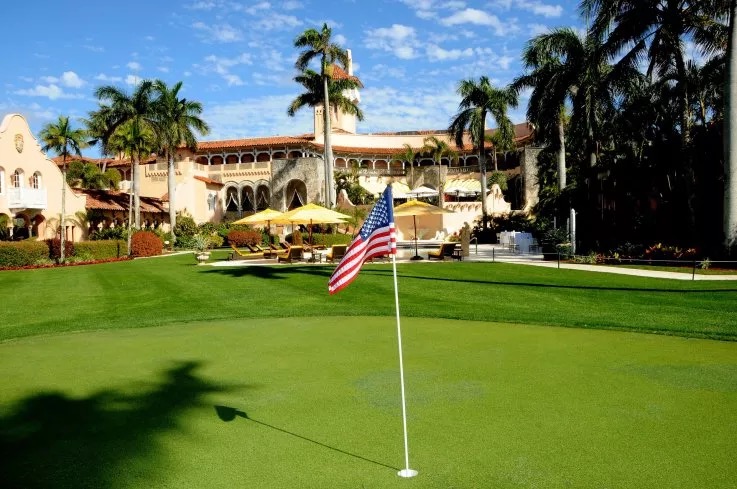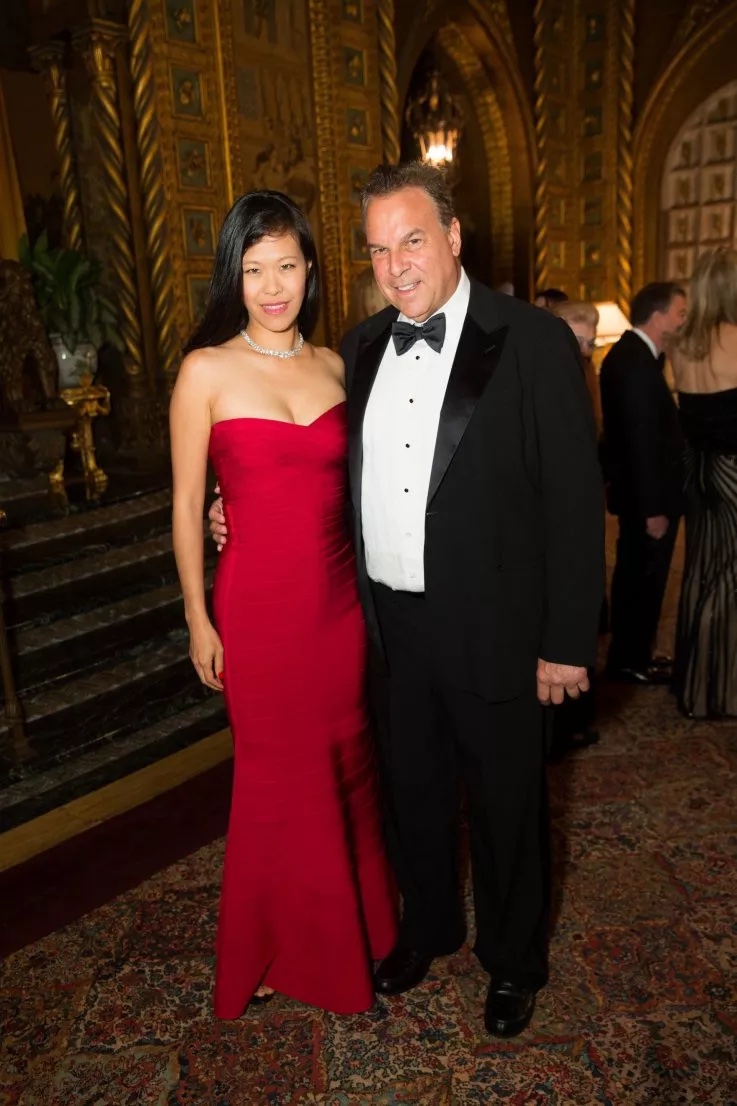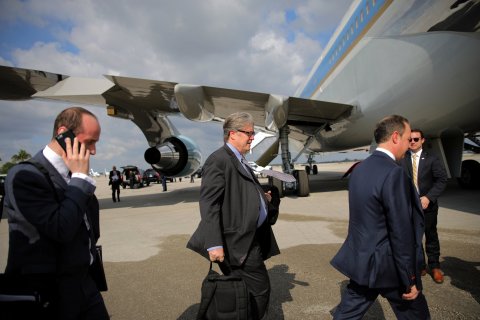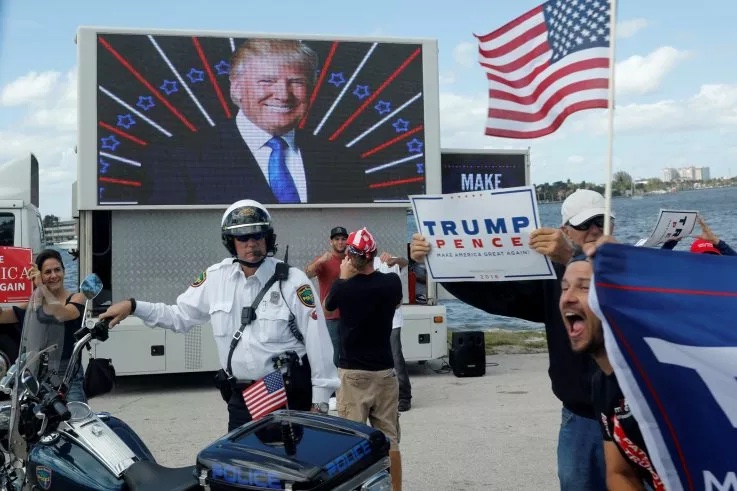Donald Trump, West Palm Beach and the Rise of the New Wall Street
The night I flew into West Palm Beach, a string of deadly tornadoes ripped across Florida. High winds pounded surf against jagged coastline and whipsawed the 100-foot-tall trees along Royal Palm Way—what locals call Bankers’ Row.
It was just a few days after Donald Trump’s inauguration. A couple of miles down the road, seemingly oblivious to the approaching storm, hundreds of revelers packed Mar-a-Lago, the Great Gatsby–esque private resort Trump has dubbed his “Winter White House,” to fete their new king. The private event, attended by Palm Beach’s billionaires, entrepreneurs and socialites, featured dinner and dancing, a replay of Trump’s swearing-in ceremony and a mammoth ice sculpture of the American flag with “President Trump” emblazoned on the base in red.
In such rarefied circles, it’s not unusual to bump into people who spent their childhoods riding around in limos with their nannies, and, in their retirement years, put off a spouse’s funeral so they could enjoy the last days of what Palm Beachers call “the Season”—roughly four months of epic winter bashes and galas that run from late November to early April every year. When the parties end, Palm Beach island’s population promptly shrinks from 30,000 to 10,000.
Trump’s party occurred at the height of this season, but one of the president’s neighbors, real estate magnate and billionaire Jeff Greene, did not attend. “He’s a very good host. I have to give him credit,” says Greene, who knows Trump casually and is a member of Mar-a-Lago. “But I don’t agree with his politics. I think some of the things he did to get himself elected paved the way for much more dangerous rhetoric in our country.”

DAVIDOFF STUDIOS/GETTY
A golf course on the west lawn of the Mar-a-Lago estate in Palm Beach, Florida.
Even before Trump became president, what was once a sleepy patch of Florida regional banks at the foot of Mar-a-Lago was coalescing into a financial center. Over the past few years, the area has attracted more than 60 hedge funds (some say well over a 100), dozens of private equity companies and hundreds of family offices—not to mention a rising number of larger banks like Credit Suisse, Morgan Stanley, JPMorgan Chase and Goldman Sachs. These are not just picayune satellite offices. Banks and billion-dollar hedge funds are swallowing up entire building complexes and blocks of commercial real estate, prompting residents to christen the area “the new Wall Street.”
Meanwhile, some of Trump’s trusted advisers and supporters have also flocked to the area. Anthony Scaramucci, founder of the $12 billion fund SkyBridge Capital, opened offices in Palm Beach Gardens two years ago. (This year, he agreed to sell the company after being named to the executive committee of Trump’s transition team in November.) Billionaire hedge fund manager Paul Tudor Jones, who says he’s counting on Trump’s support to save the Florida Everglades, bought the former estate of Ron Perelman in Palm Beach for $71 million in 2015. Carl Icahn, another hedge fund billionaire, whom Trump appointed to his transition team, is a part-time resident of Palm Beach who has an estate near Mar-a-Lago. And senior members of Team Trump have homes nearby as well, including Cabinet members Wilbur Ross, the secretary of commerce; Ben Carson, secretary of housing and urban development; Betsy DeVos, education secretary; and Gary Cohn, who left Goldman Sachs to head Trump’s National Economic Council.
Palm Beach County has long been a magnet for old-guard wealth—most of it is confined to the “island,” a slim, 30-mile spit that, since Victorian times, has attracted dozens of billionaires, who have built their mansions along its northern tip. Part of the attraction: Florida has not had a state income tax since 1855. But the hype surrounding Trump’s victory is prompting a new influx of financial companies. “A lot of people who previously thought, I think I’ll move to Florida, let’s go to Miami, are now taking a look at Palm Beach,” says Greene. “Because you turn on the TV and you don’t see Trump in the White House. You see him here.”

CARLOS BARRIA/REUTERS
Greene did not vote for Trump. Nor did the majority of Palm Beach County, but many of its residents are benefiting from his presence. Trump’s ascension has created one of the world’s greatest concentrations of global wealth and power right in their backyard. And that shift could mean a massive change in fortunes, not just for the superrich families who have made their homes in Palm Beach over the past century—the Fords, DuPonts, Rothschilds, Pulitzers and Lauders—but also for the area’s long-overlooked middle class.
Even before Trump became president, what was once a sleepy patch of Florida regional banks at the foot of Mar-a-Lago was coalescing into a financial center. Over the past few years, the area has attracted more than 60 hedge funds (some say well over a 100), dozens of private equity companies and hundreds of family offices—not to mention a rising number of larger banks like Credit Suisse, Morgan Stanley, JPMorgan Chase and Goldman Sachs. These are not just picayune satellite offices. Banks and billion-dollar hedge funds are swallowing up entire building complexes and blocks of commercial real estate, prompting residents to christen the area “the new Wall Street.”
Meanwhile, some of Trump’s trusted advisers and supporters have also flocked to the area. Anthony Scaramucci, founder of the $12 billion fund SkyBridge Capital, opened offices in Palm Beach Gardens two years ago. (This year, he agreed to sell the company after being named to the executive committee of Trump’s transition team in November.) Billionaire hedge fund manager Paul Tudor Jones, who says he’s counting on Trump’s support to save the Florida Everglades, bought the former estate of Ron Perelman in Palm Beach for $71 million in 2015. Carl Icahn, another hedge fund billionaire, whom Trump appointed to his transition team, is a part-time resident of Palm Beach who has an estate near Mar-a-Lago. And senior members of Team Trump have homes nearby as well, including Cabinet members Wilbur Ross, the secretary of commerce; Ben Carson, secretary of housing and urban development; Betsy DeVos, education secretary; and Gary Cohn, who left Goldman Sachs to head Trump’s National Economic Council.
Palm Beach County has long been a magnet for old-guard wealth—most of it is confined to the “island,” a slim, 30-mile spit that, since Victorian times, has attracted dozens of billionaires, who have built their mansions along its northern tip. Part of the attraction: Florida has not had a state income tax since 1855. But the hype surrounding Trump’s victory is prompting a new influx of financial companies. “A lot of people who previously thought, I think I’ll move to Florida, let’s go to Miami, are now taking a look at Palm Beach,” says Greene. “Because you turn on the TV and you don’t see Trump in the White House. You see him here.”
More to the point, you see him kibitzing with the world’s foreign leaders, dignitaries and billionaires. In fact, before Trump took office and before he began meeting with presidents and prime ministers at his Palm Beach resort—even before Americans started seeing members of Mar-a-Lago on Facebook posing casually with the nuclear football—Trump’s transition team was already calling the White House in Washington, D.C., “White House North.”
Planes, Cranes and Red Carpet Tours
Trump’s Palm Beach island has long been the aristocratic oasis to West Palm Beach’s grittier, skyscraper-and-cement landscape—the two narrowly separated by only a small drawbridge spanning the Atlantic’s Intracoastal Waterway. A 1936 issue of Fortune still hanging in one West Palm Beach restaurant describes the city’s inhabitants as existing “chiefly to serve Palm Beach [and] carry the bags and service the cars and wash the linen of the rich who live across the water.” But it is West Palm Beach, the county seat, that stands to benefit most from Trump’s draw.
Once a major stop on America’s “cocaine highway,” West Palm Beach has better growth prospects and just as frothy a jobs market as New York City. As a result, the region has seen a flood of people in recent months coming to look for jobs, housing and office space. According to a recent study commissioned by the city of West Palm Beach from business consultancy Alpern Rosenthal, an average of 2,000 new residents are relocating to Palm Beach County every month. As of March, the city had more than $2 billion of real estate construction in the pipeline, says Chris Roog, the city’s director of economic development.
The city’s skyline is filled with cranes. Offices, apartments and public transit hubs are sprouting up. West Palm Beach’s planners are overrun with blueprints for new developments, including several from Greene, who is investing hundreds of millions of dollars to build office and residential towers throughout the city, as well as micro-units downtown for millennials. (He’s hoping to charge around $1,000 a month for a 400-square-foot unit—less than what many pay now.) Greene has also opened a private school in West Palm Beach for the city’s gifted children, featuring robotics, “mindfulness rooms” and computer coding classes for kids 3 years and up.
Since Trump’s victory, the boom has only accelerated. Just as Trump was preparing to head to Mar-a-Lago to celebrate Christmas with his family, West Palm Beach unveiled its Flagler Financial District—a narrow slice of upscale office properties overlooking the Intracoastal Waterway and its flotillas of mega-yachts. Covering half a square mile at the base of the drawbridge leading to Bankers’ Row, the center is named for Henry Flagler, a founder of Standard Oil and the architect of the island’s gilded age.

DON EMMERT/AFP/GETTY
Revelers line up to enter Trump’s New Year’s Eve party on December 31, 2016 at Mar-a-Lago.
“We are now very short on class-A office space,” says West Palm Beach Mayor Jeri Muoio, sporting red nails, glittering diamond rings and a leopard-print top. She tells Newsweek that, since December, the city has been actively courting Wall Street executives with an ad campaign in New York’s tri-state area, urging them to move south. West Palm Beach also just finalized a package of generous incentives that, over 10 years, will offer property tax breaks for companies bringing in new jobs—especially high-paying ones.
While many of the financial companies coming to Palm Beach County—often to discreetly cater to the needs of its ultra-wealthy families—aren’t very keen to talk about it, real estate outfit Cushman & Wakefield is tracking the trend. In January, it released data showing that “aggressive hikes” in rents across the region haven’t discouraged the phalanx of financial companies moving in. These businesses scarfed up hundreds of thousands of square feet of commercial space last year, it said, even as rents leapt by more than 21 percent. “It’s no longer God’s waiting room in southern Florida anymore,” says Mark Pateman, managing principal at C&W. “People are coming down here with their families and settling here permanently. Maybe they bring their own company, or maybe they’ve had a capital event and trade their own money.”
Just weeks after Trump clinched the presidency, the Milken Institute’s Center for Jobs and Human Capital released its best-performing cities survey, which ranked the overall financial growth of West Palm Beach’s metro area above those of New York City and Boston, as well as the nation’s dominant hedge fund district, Greenwich, Connecticut. (Over the next decade, the number of jobs in the city is expected to skyrocket as much as 40 percent, led by finance and high tech.) The think tank also noted that wage growth in Palm Beach County since the Great Recession has topped that of New York’s metropolitan area, still the finance capital of the world—at least for now. “You can get everything here, except for snow skiing,” says Greene.
Joseph Jacobs, president of Wexford Capital, a $3 billion private equity company, is one of Palm Beach’s recent Wall Street transplants. He says relocating to the Flagler District was “frictionless,” and Wexford enjoyed one of its best-performing years since the move. What he doesn’t miss about New York or Greenwich, he says, are the crowds, the lengthy commutes and the freezing weather. “When you’re here, there’s a lot less noise,” he notes. “And there’s less stress. You get more done. Why on earth would you live in New York or Connecticut when you could wake up here every day?”
Jacobs still has a 12-acre spread in Greenwich but says the property values there are plummeting. “The trends are increasingly favorable here,” he says. “The trends are just not that favorable anymore in the Northeast.”
Travel is also staggeringly easy in West Palm Beach. Its international airport is only 10 to 15 minutes from downtown. Emily Clifford, executive director at J.P. Morgan Private Bank, situated along Bankers’ Row, says it’s one of Palm Beach’s biggest perks. “I can be on a 6 a.m. flight out in the morning, in New York by 10:30 a.m. for meetings, spend the day there and be back in my bed that night.” And this summer, West Palm Beach will offer a high-speed express train connecting the city’s downtown to Fort Lauderdale and Miami. In 2018, the line will also reach Orlando. The trip from West Palm to Miami—Florida’s other major financial center—will take just an hour.

CAPEHART/GETTY
Billionaire Jeff Greene and his wife Mei Sze Chan attend the 58th International Red Cross Ball at Mar-a-Lago on February 28, 2015. Greene did not vote for Trump, nor did the majority of Palm Beach County.
For many of Palm Beach’s transplants, nothing beats the zero state income tax. If you’re lucky enough to make a $1 million a year, that’s an automatic income bump of $100,000 if you just left New York—or like getting a decent-sized raise no matter how much you make. Capital gains, estate and corporate taxes are also far lower in Florida than in New York, New Jersey, Massachusetts and Connecticut, according to the recent study by Alpern Rosenthal. The state is basically a giant tax shelter: The higher your earnings, the more you stand to keep when you move south. Which is why so many 1 percenters are heading to Florida, says Kelly Smallridge, president and chief executive of Palm Beach County’s business development board in West Palm Beach.
At any given time, Smallridge says, she’s advising around a dozen or more ultra-wealthy families looking to move south, while fielding hundreds of phone calls a month from people interested in doing the same. Wexford Capital’s Jacobs was among those Smallridge helped settle into the area full time—although he says he’s spent time in Palm Beach since the 1980s. Jacobs says while some of his Wexford’s portfolio managers are still working from Greenwich, many of his senior staffers have moved to Palm Beach, and he expects more will follow. “This is no longer just a seasonal community,” he says. “There’s a larger subset of people moving down here from up north than ever before. And it’s not just the hype over Trump. A lot of it is being driven by technology. People are so much more mobile today. You don’t have to live in New York to be competitive in finance anymore. So why live there if you don’t want to?”
Power Brokers in Sandals
On a Tuesday in late January, at the new Hilton hotel in West Palm Beach, I met with Andrew Schneider, 43, the founder and chief executive of Family Office Networks, a financial company that pairs wealthy families with hedge funds, bankers and startups looking to raise cash. In the darkened lobby bar, I watched him hold a series of Shark Tank –style pitch sessions with young entrepreneurs touting new applications for blockchain technology and, later, a physician looking for investments in breakthrough cancer research. “I think of myself as a matchmaker, introducing family offices to people who bring us investment opportunities,” says the native New Yorker, who now lives in Palm Beach year-round. When not arranging deals for what he says is his network of around 10,000 high-net-worth families who run private investment offices, he likes to scuba dive and spend time on his boat. “The quality of life is so much better,” he says.
Palm Beach’s power brokers ink deals in bars, restaurants and coffee shops. They hash out financial terms and sometimes even sign contracts in the cocktail lounge over highballs and martinis. In my 20 years covering Wall Street, I have never seen so many deals get done in front of me—and with such insouciance—as I did during my week in Palm Beach.
One of the main reasons a younger, more entrepreneurial crowd is coming to the area is because the scene is so ideal for fundraising, says David Goodboy, founder of the Palm Beach Hedge Fund Association (and another Wall Street escapee). “Hedge funds follow the money, and the money is moving here,” he tells Newsweek. “Because the community is so small, there’s really very little anonymity. You have unprecedented access to investors and opportunities to meet new clients.”
When SkyBridge Capital moved to Palm Beach, its chief investment officer, Ray Nolte, said one of the biggest motivating factors was the fact that South Florida “is one of the top regions from which we are raising assets.” Smallridge credits the increase in fundraising opportunities to the fact that the CEOs, presidents and chairmen coming to West Palm Beach are not just using it as a vacation spot anymore but bringing their companies with them, creating “a very high concentration of top brass in one place.”

CARLOS BARRIA/REUTERS
Senior advisor Stephen Miller, left, Senior Counselor Steve Bannon, center, and White House Chief of Staff Reince Priebus board Air Force One to accompany Trump to Tampa on February 6.
Palm Beach’s social scene similarly makes it much easier to raise funds there than up north, notes Kevin Bush, a hedge fund manager who voted for Trump and opened an office in Delray Beach in November. Not just because there’s a higher concentration of wealthy people but because they are much more relaxed. “It’s a rare place, because everyone is so rich,” he says. “I travel back and forth to New York every single month raising money, and my experience is, the environment here affects how people act. People go to meetings in Palm Beach sometimes wearing sandals. They’re approachable. When you’re walking through midtown Manhattan in a suit, your guard is up. It’s less formal here, and that’s usually better.”
What’s not better is the traffic. “When I drive from my house to my office on South Ocean Boulevard,” Greene says, “I get stuck behind cars going very slowly by Mar-a-Lago with the video cameras.” Roog, the economic development director—a former Trump valet who once drove the mogul’s purple Lamborghini—says it’s the same for the city. When the president touches down at West Palm Beach International Airport, it’s mayhem.
“Here’s how it goes,” Roog says. “Trump lands. He gets out of the plane. He gets into a private car. And then it’s full-on speeding as fast as possible to Mar-a-Lago. They change the traffic lights so they stay on green all the way. But it wreaks havoc on the traffic. And there are reporters, protesters, cops. People taking pictures on the tarmac with Air Force One.”
The Big Man in the Brioni Suit
Not long after I arrived in Florida, I attended a private party for the launch of a rare book shop on Palm Beach’s glamorous Worth Avenue—the Rodeo Drive of the south. Artists, entrepreneurs and hedge funders sipped champagne while listening to opera singers harmonize against violins. High-end collectors leafed through first-edition books from the shop’s wide selection of Wall Street classics, such as The Road to Serfdom and Reminiscences of a Stock Operator. The crowd had every bit of the financial firepower of an exclusive Wall Street event. And not surprisingly, many of them knew Trump or had frequented Mar-a-Lago.
Ron Burkhardt, an artist who recently moved to Palm Beach from the Hamptons (and has slept in Mar-a-Lago’s Lincoln Bedroom—yes, the Winter White House also has one), says Trump’s victory put Palm Beach “back on the map” for the first time since the Kennedys sold their home here in the mid-’90s. “This is kind of the center of the universe now,” he says. “It’s like the whole world has their eyes on us.”
That’s certainly been true over the past few months, as the world watched Trump scramble to respond in February to North Korea’s launch of a ballistic missile into the Sea of Japan as he dined with Japanese Prime Minister Shinzo Abe at Mar-a-Lago. Or in early March, when the president repaired for the weekend to his Palm Beach resort, only to begin accusing his predecessor, Barack Obama, of wiretapping his phone at Manhattan’s Trump Tower during his presidential campaign.

JONATHAN ERNST/REUTERS
In March, Trump announced plans to host China’s president at Mar-a-Lago—an event that will be easy enough for the club’s visitors to witness, take pictures of or even participate in, if Trump dines on the open-air terrace. And although he’s commander in chief, Trump’s club members say he’s still quick to mingle and preen with his guests, whether at Mar-a-Lago or his swanky golf club in West Palm Beach.
Greene, who recently took his mother to dinner for her 90th birthday weekend at Trump’s golf club, says they ran into him. And he was still obsessing about the election. “During the cake, he was clapping in the back,” Greene says. “And then walking out, he said to my mother, ‘You’re not 90! You’re 70. Come on!’ He was trying to be friendly in a cute and nice way. And then he said, ‘Hope you’re upset with your son for not supporting me!'”
Ashley Cooper, a former Wall Street banker who once worked for the Trump Organization as executive vice president and managed its golf properties before Trump became president (he’s also a Trump voter), says he believes his ex-boss is well intentioned. “I think what drives him is…he’s not doing it for the money anymore. He’s motivated by winning. He wants to be the best president America has ever had. He wants to lead a nationwide economic revitalization. He truly believes there was a massive part of America that was lost due to politics. And he’s the guy in the Brioni suit who’s reaching out to them.”
While Trump’s presence is certainly benefiting West Palm Beach, unlike Greene, he hasn’t personally invested in the city for decades. Still, there are relics of his halcyon days. One evening, while on my way to an interview, I passed a set of older residential towers along West Palm Beach’s Flagler Drive: Trump Plaza, the high-rise condos the president was forced to liquidate in the 1990s to pay off his debts. They’re a stark reminder of just how far Trump—and the city—have come.
